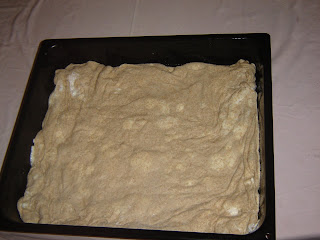
Hungry yet? If Muki’s ratiocinations don’t send you straight to the feedbowl then I don’t know what will. With a plate full of gratitude for this generous preamble, and a grumble of hunger for further accounts of Muki’s valiant attempts to substitute picaresque encounters with the absurd for the banal nourishment offered by what we humbly refer to here as “food,” we dive directly into the bowels of the matter—bread and fat, the fundamentals of Bosnian cuisine. In a word—maslanica, with its evocation of mast (fat). In a phrase—zamastiti bradu (to get one’s beard greasy), the consequence of its ingestion.
My first encounter with this formidable victual occurred in a small town in north central Bosnia. The story unfolded in the usual fashion. At a café my companion, thinking he recognized a distant cousin, struck up a conversation with a man who turned out to be not his kin but a local poet. Coffee led to several coffees and then to lunch at a restaurant. Unsuspectingly I ordered the aforementioned—thin layers of bread brushed with oil and kajmak (a dairy product resembling pungent, somewhat friable sour cream) and compressed into one pleasingly compact brick. This particular maslanica came doused with gravy and crowned with a veal chop. Not my first introduction to the concept of a meal as a test of stamina—to boost my confidence, I recalled a six-hour French meal successfully endured. But whereas that ordeal involved modestly-apportioned courses doled out over the span of an entire evening, this restaurant packed all its calories into one staggeringly heavy dish. I watched in astonishment as my tablemates dispatched their portions with ease, transitioning briskly to yet more coffee and, my god, dessert. I tried in vain to keep up, but my maslanica simply vanquished me. Meanwhile the writer, in a gesture that was either surpassingly romantic or utterly homicidal, lit cigarette after cigarette for his chain-smoking wife, then his own, without missing a beat. I realized that the past eight years of living in northern California had done nothing to prepare me for the rigors that Bosnia would present.
Here’s a Bosnian friend’s recipe for Whole Wheat Maslanica. The recipe comes from north Bosnia but can vary by region. Add a glass of yogurt and salad and you have yourself a meal.
1 kg whole wheat flour
0.2 kg flour
0.5 kg homemade kajmak (or substitute sour cream)
0.25 liters buttermilk
oil
salt
0.75 liters warm water

Stir together kajmak, buttermilk, and a little salt and oil.

Mix the flour, a little salt, and warm water, knead the dough, and divide it into two parts.

Roll out until each half reaches the dimensions 1 x 0.8 meters. Sprinkle the kajmak mixture onto the dough.

Fold each half of the dough into the shape of a letter

Keep folding...

Done!

Place one square of folded dough on top of the other in a pan.

Bake at 180 C for around 40 minutes. Enjoy!